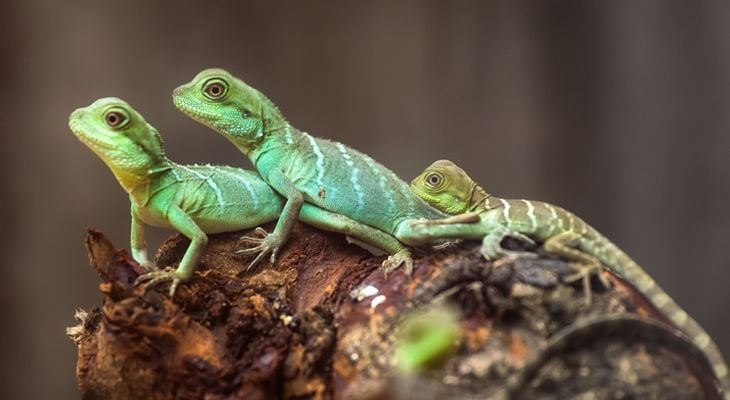Your pets probably don't understand that in nine months a new baby will be joining your family, but dogs and cats do detect differences in mood, posture, behavior, and body chemistry that clue them that an enormous change is happening. Your dog or cat will pick up other signs, too: Our four legged
Read more

People with limited living quarters may find that reptiles such as lizards or turtles fit perfectly into their lifestyles. Before deciding on a reptile, learn as much as possible about them and their needs. Poisonous snakes and certain reptiles should never be kept as pets. Ask your veterinarian about the suitability of a particular animal before you make your decision. There are many things to consider before committing to a reptile as a pet.
Finding out if a Pet is Legal Where You Live
Many areas have enacted laws pertaining to keeping reptiles. Some are general and some are quite specific; in many places any reptiles that are considered dangerous (venomous snakes, alligators, etc.) are illegal but some places are even more restrictive (for example, in some states all constricting snakes including ball pythons are illegal).
Salmonella Risks and Prevention
All reptile owners need to be informed about Salmonella infections. While the risks shouldn't keep most people from keeping reptiles since with the proper management the risks are minimal. Still, owners should be aware of the risks, and the US Centers for Disease Control recommends that certain risk groups should be careful about contact with reptiles and amphibians.
The Importance of Light and Heat
Many problems with keeping reptiles can be traced back to not providing the proper environmental conditions, particularly heat. Proper lighting is also important for many reptiles. The equipment to provide the proper heat and light to captive reptiles is often quite expensive, but is absolutely essential to keeping pet reptiles healthy. It is important to find out exactly what conditions your reptile needs and never cut corners when it comes to meeting those conditions!
Why Choose Captive Bred Reptiles
There are numerous reasons why you should pick a captive bred reptile if at all possible, as explained here.
How to Pick a Healthy Reptile
It is important to keep in mind that depending on where you get a reptile, it may be very stressed, dehydrated, and prone to illness. Here are some items to look for when buying your reptile to increase the chances of picking out a healthy pet reptile.
While there are many types of reptiles that could be good pets, here we cover a few you could consider.
-
Can Pets Sense Pregnancy?
Category: Newsletter Library, Newsletter Archive, Unbelievable Pets
-
A Guide to Pet Nutrition
Category: Newsletter Library, Nutrition & Food
In 2007, several million bags of pet food were recalled in the United States due to contamination. Though some of the recalls were done by the manufacturers voluntarily to "be safe," some of the recalled food was found to have contaminated vegetable proteins. Several pets unfortunately died, and even
Read more -
Do Cats Really Love Milk?
Category: Newsletter Library, Cats
Cats, unlike dogs, are true carnivores which means they thrive on meat only diets and require no vegetable, grain, or dairy supplementation. Cows milk is not recommended for cats because it can be too rich for their digestive systems. This is because most cats can't digest milk properly because it contains
Read more -
Anesthesia Free Dentistry
Category: Newsletter Library, Visiting the Vet
Does your dog have stinky breath? Do your cat's teeth look brown? In fact, periodontal disease is the most common disease that pets develop. It is estimated that 80 to 85% of dogs and cats have some degree of infection. It is not just a cosmetic problem, chronic infection shortens their life because
Read more -
Camping With Your Pets
Category: Newsletter Library, Newsletter Archive, Fun with Pets
Camping is an increasingly popular activity for families and their pets. Many dogs and some cats enjoy traveling with their families. Here are a few tips to help make your pet's adventure into the great outdoors a success. Research the campground or area that you are planning on visiting. Not all
Read more -
6 Rules to Improve Your Cat's Diet
Category: Newsletter Library, Cats
Do Not Overfeed "Obesity is the most common nutritional disease seen in cats," says Joe Bartges, DVM, PhD at the University of Tennessee's College of Veterinary Medicine. It is a common bad habit for cat owners to feed their cats too much. Cats only need 24 to 35 calories per pound of body weight each
Read more -
All About Hairballs
Category: Newsletter Library, Cats
Does your favorite feline leave you hairballs as gifts? If so, you’re not alone. Although we love cats for being meticulous groomers, it’s safe to say we don’t like finding hairy presents around the house. Let’s explore what causes hairballs and how to prevent them. What Causes a Hairball? Hairballs
Read more -
5 Ways to Protect Your Dog's Hearing
Category: Newsletter Library, Keeping Pets Healthy
The acuity of your family dog's hearing far surpasses that of humans. Hearing is a critical sense to dogs, and when diminished, will increase dependency on the sense of smell. When a dog hears something, he can hear it without moving his head. Many muscles surrounding the ears help dogs get premium sound
Read more -
Captive Reptiles May Have Nutritional Deficiency
Category: Newsletter Library, Nutrition & Food
Pet owners keeping reptiles in captivity as household pets may sometimes find that their pets have a nutritional deficiency. Metabolic bone disease is "the most common nutritional deficiency affecting captive reptiles," advises veterinarian Fredrick L. Frye in Reptile Care: An Atlas of Diseases and Treatments.
Read more -
Bringing Dog Vision in Focus
Category: Newsletter Library, Keeping Pets Healthy
Veterinary ophthalmologists are often asked, "How well do animals see?" Visual function involves a combination of many factors, including: the field of view, depth perception, acuity, perception of motion, and color differentiation. All of these functions must then be integrated by the brain to produce
Read more -
How to Clean Your Pet's Teeth
Category: Newsletter Library, Keeping Pets Healthy
Per their dentist’s recommendation, most people brush their teeth twice a day and floss once a day. Practicing regular at-home care and routinely visiting an oral health professional can help prevent bad breath, tooth decay and gum disease. Having good oral hygiene practices is also essential for helping
Read more -
How to Control Bad Breath in Pets: Tips & Tricks
Category: Newsletter Library, Keeping Pets Healthy
There’s nothing fun about getting a slobbery wet kiss from a dog or a cat with bad breath! Bad breath, also known as halitosis, is generally caused by excessive build-up of odor -producing bacteria inside your pet’s mouth, lungs, or even gut. While most cases of bad breath can be traced back to poor
Read more -
Bird Grooming - Wings, Beaks & Nails
Category: Newsletter Library, Keeping Pets Healthy
The grooming that is necessary for birds is something that may get overlooked, since typically we don't let them constantly roam freely around our houses like with other pets. However, just because they are set on a perch safe within their cages doesn't mean that their maintenance should be any less.
Read more -
Does Your Cat Need Vaccines?
Category: Newsletter Library, Cats
In a word, yes. “No other medical development has been as successful as vaccination in controlling deadly diseases in companion animals,” says feline veterinarian Dr. Arnold Plotnick. The Exception Dr. Plotnick and other veterinarians acknowledge that, rarely, vaccinations in cats have been linked
Read more -
Do I Have to Vaccinate My Pet?
Category: Newsletter Library, Keeping Pets Healthy
Not sure if your furry friend really needs those vaccinations? Skipping them can cause serious health problems - for your pet and you.
Read more -
Understanding Renal Failure in Cats
Category: Newsletter Library, Cats
Acute renal failure and chronic renal failure are two health problems that commonly affect cats. Acute renal failure can affect cats at any age; emergency care is essential to treating this condition and saving a cat’s life. Chronic renal failure typically occurs in senior cats. According to the American
Read more
Location
Find us on the map
Burlingame Veterinary Clinic
8511 SW Terwilliger Blvd.
Portland, OR, United States

